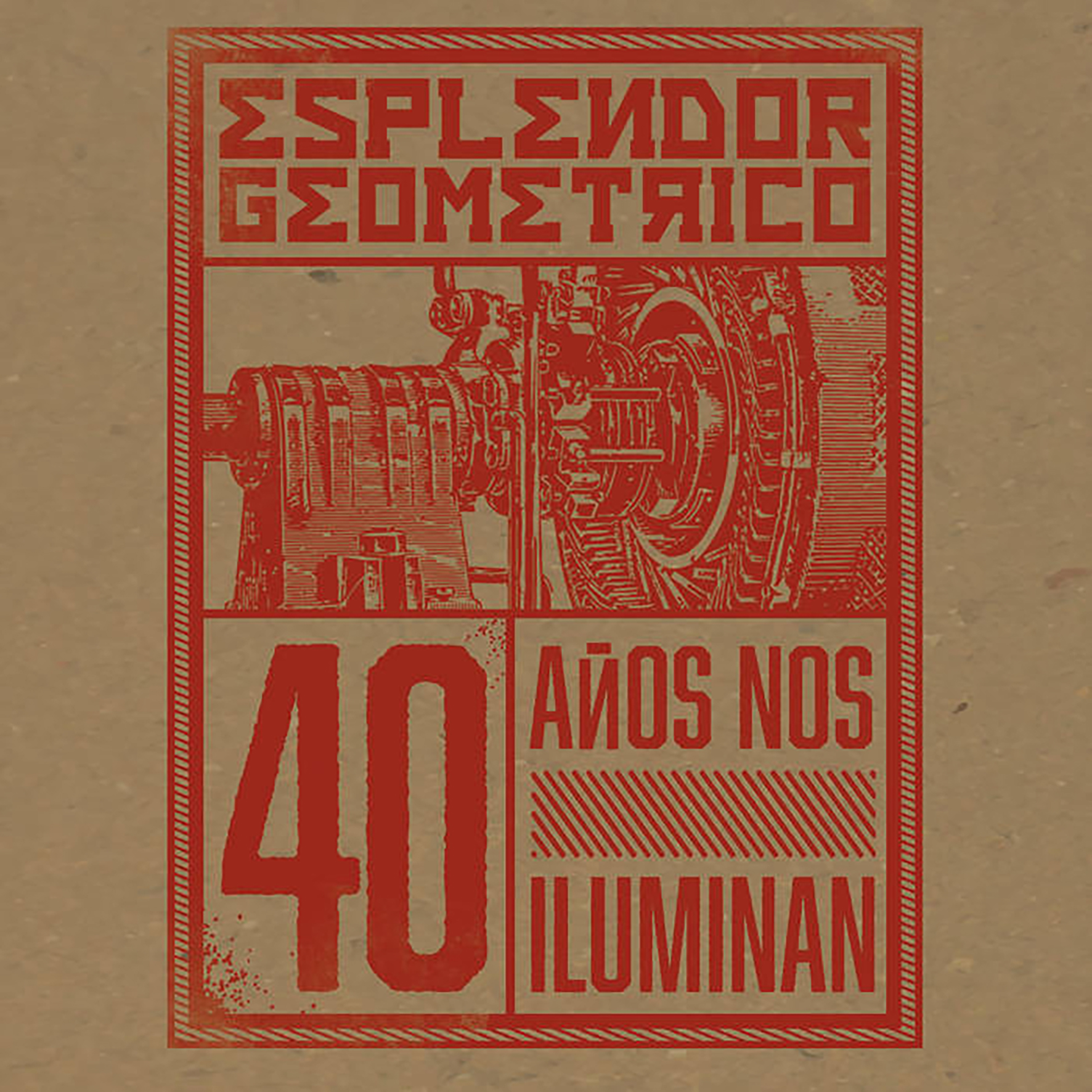 This is definitely one of the more confounding Esplendor Geométrico releases in recent memory, as it is ostensibly a celebration of the project's 40th anniversary (the title translates as "40 years illuminate us"), but is also ostensibly all-new material that somehow feels like at least three different bands. There is a logical explanation for that, as the album features several collaborations, some recent compositions, and a number of noisy, pummeling throwbacks to EG's early years (presumably revisiting that style with the benefit of four decades of illumination). An impressively honest additional explanation can be found in the liner notes, however, as the duo note that neither member makes a living from music, which frees them to "do what they want without even thinking of what their fans and followers expect." As a longtime EG fan, I can confirm that this album was definitely made without any consideration for whether or not I would like it (or whether it even makes complete sense). Then again, anyone who has been releasing great albums for several decades is entitled to celebrate with a go-for-broke, everything-but-the-kitchen-sink epic if they feel like it. It is all perfectly fine by me, but anyone simply searching for a good recent EG album should give this one a wide berth and head towards Cinética instead (also from 2020). That said, there are definitely plenty of bludgeoning percussion assaults here that fans of the project's noisier side will enjoy (as long as they do not mind sifting through an unusually prickly, blunt, eclectic, and overwhelming batch of songs).
This is definitely one of the more confounding Esplendor Geométrico releases in recent memory, as it is ostensibly a celebration of the project's 40th anniversary (the title translates as "40 years illuminate us"), but is also ostensibly all-new material that somehow feels like at least three different bands. There is a logical explanation for that, as the album features several collaborations, some recent compositions, and a number of noisy, pummeling throwbacks to EG's early years (presumably revisiting that style with the benefit of four decades of illumination). An impressively honest additional explanation can be found in the liner notes, however, as the duo note that neither member makes a living from music, which frees them to "do what they want without even thinking of what their fans and followers expect." As a longtime EG fan, I can confirm that this album was definitely made without any consideration for whether or not I would like it (or whether it even makes complete sense). Then again, anyone who has been releasing great albums for several decades is entitled to celebrate with a go-for-broke, everything-but-the-kitchen-sink epic if they feel like it. It is all perfectly fine by me, but anyone simply searching for a good recent EG album should give this one a wide berth and head towards Cinética instead (also from 2020). That said, there are definitely plenty of bludgeoning percussion assaults here that fans of the project's noisier side will enjoy (as long as they do not mind sifting through an unusually prickly, blunt, eclectic, and overwhelming batch of songs).
For better or worse, Arturo Lanz and Saverio Evangelista definitely did not exert themselves coming up with anything beyond just beats and textures for this album. Given EG's considerable prowess in those regards, however, that is hardly a deal-breaker and may even be considered an "all killer, no filler" back-to-basics treat (depending on one's perspective and appreciation for well-executed brutality). In theory, all the best pieces should be on the first disc since the second one is composed of pieces omitted from the vinyl. In reality, however, there are gems scattered fairly liberally across both halves. On the main album, there are a few enjoyable collaborations and a number of EG's standard bulldozing rhythmic juggernauts, but there are some real surprises too. The biggest one is probably the psychotropic sound collage "Buenos Días," which sounds like loops of machine noise jamming with ducks, bullfrogs, and a language tape, but my notes for other songs are filled with phrases like "a herd of cows and a bad metal guitarist just crashed band practice," "Muslimgauze with the intensity dialed up too high," "wrong-speed party anthem," or "a churning, unstoppable industrial groove just rolled through a playground and crashed into an arcade." That last piece ("Vuelve A Jugar") is one of the album’s best, though I also enjoyed "MokBa" quite a bit (massive primitive robots transform a political march into a delightfully lurching dance party). Weirdly, the second disk probably has the better hit-to-miss ratio and the wildest twists. For example, "Avanti" sounds like NWW went completely feral while recording "Rock’n’Roll Station," while "Hungry" resembles a power electronics guy and a black metal band collaborating on an absolutely scorching drone album. Elsewhere, "Trans" evokes a heaving half-gelatinous/half-mechanized horror, while "Tribuna Del Trabajo" sounds like an weirdly sensual and industrial-damaged festival parade shimmying its way through a vintage arcade. Admittedly, trying to listen to the entire album in one sitting makes me feel a bit psychologically mauled, frazzled, and exhausted, but there are quite a few songs here that make their impact deeply felt when experienced by themselves. If anybody ever asked me which album I would absolutely want on my side in a brawl, it would most likely be this one.
Samples can be found here.
Read More

